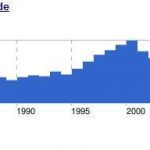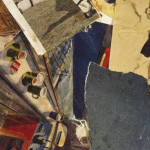2011
Gregg Biglieri offers some advice on reading McElroy: jettison one's habitual grammars and adopt the grammars of time and timing. Become an expert in sound. Become all ear.
Is 'overinterpretation' good or bad? Is it even possible, and is it ever enough? (Or are we reading too much into this?) Clint Burnham shadows Colin Davis as he traces the interventions of a "wild bunch" of critics, theorists, and philosophers, who grapple with the question of what counts as a reading of a literary text.
Citing the narrator's radical ambivalence about time, history, and the flesh, Maureen Curtin argues that American Genius, A Comedy represents the hysteria of the contemporary "post-political" moment.
Contrasting Lynne Tillman's text with the "complicitous critique" of Donald Barthelme and other postmodern ironists, Sue-Im Lee argues that Tillman's narration displays the "mobility" of Adornian cultural criticism, in which contradiction is not a problem but a mode of interrogating the present.
Most recent "Great American Novels" are not great, but merely big. Lynne Tillman's American Genius, A Comedy, by contrast, is designed with scale, not size, in mind. So argues Kasia Boddy, who reads the novel as a critical engagement with book reviewers' favorite cliché for ambitious social fiction. Instead of resisting cultural obsolescence through sheer assertion, Tillman's book examines how the cracks and contradictions of American ideology have imprinted themselves on the individual body, bearer of the national disease: sensitivity.
"Like skin, the comma both connects and divides." Peter Nicholls traces Tillman's endlessly subordinating, endlessly equivocating sentences, showing how their quest for historical and social clarity passes through an interminable sequence of deferral and denial.
How do you annotate an experience? Stephanie Boluk and Patrick LeMieux grapple with competing logics of computer code at the intersection of Adventure, nostalgia and new media scholarship.
In Week 3 of a six-part series, Critical Code Studies contributors spelunk the mysteries of Colossal Cave Adventure, a seminal text adventure game. Delving into close readings of the original FORTRAN code, the group plots the twisty passages linking media theory, deconstruction and philosophies of programming.
How does one write science fiction when the atom bomb (and later 9/11) makes the future seem impossible to predict? Justin Roby reviews Paul Youngquist's Cyberfiction: After the Future, which explores how postwar "cy-fi" critiqued life in the age of cybernetic control systems.
Caroline Levine argues that Jason Mittell's attempts to classify The Wire by genre results in "some slippery logic, some fruitful and provocative but not altogether persuasive argumentative moves in Mittell's own game." She suggests that examining the show through the lens of form - not genre - clarifies why it warrants comparisons with texts like Bleak House: both works attempt to represent the distinctly networked quality of urban social life.
Can Critical Code Studies overcome the divide between technology workers and technocultural theorists?
In the second installment of a six-week discussion, contributors search for examples of Critical Code Studies "in the wild." Instead of asking how code can be read critically, they examine how code is already being created and disputed by lawyers, programmers, and the general public.
Can the rising cost of cosmopolitan real estate have brought the New York City novel to a low point? Tom LeClair measures recent fictions from and about New York City - including three "9/11 novels" - against the Systems Novel of the mid-1970s.
"What would a history of postwar U.S. literature look like that did not take society as its major organizing principle?" Daniel Worden reviews Michael Clune's American Literature and the Free Market, 1945-2000, which traces the emergence of the "economic fiction," in which the market is neither a mystified form of social relations nor an expression of individual values, but a virtual economy that structures experience.
Two innovative contemporary writers discuss the relationship between encyclopedic narrative and notions of gender and writing, the body as the physical embodiment of memory, and the unique syntax of Tillman's American Genius, A Comedy. The novel's prose depicts the way "thought, when you're not thinking, happens."
David Lavery ponders the "neo-baroque" tap-dancing of TV's most playful and commercially successful serial drama.
Jason Mittell calls David Simon's bluff: to what degree is The Wire really like a "televised novel"? To what degree is it more like a video game? Why not classify it as what it really is - a genre-spawning "masterpiece" in the medium of television.
Anthony Warde traces Daniel Punday's analysis of the intertwining strands of contemporary "fictionality," the different modes - from "myth" to "assemblage" - by which invented stories are legitimated. Punday's work implies that the active construction of 'life-fictions' is becoming more significant in contemporary technoculture, a view that runs counter to the more pessimistic view of agency in Baudrillard's Simulacrum America and other accounts of a wholly 'virtual' reality.
In this review of Robert Chodat's Worldly Acts and Sentient Things, Stephen Dougherty argues that Chodat's inquiry could have profited from a deeper engagement with posthumanist thought.
Stuart Moulthrop uses the lessons of hypertext as both an analogy and an explanation for why hypertext and its criticism will stay in a "niche" - and why, despite Bell's concern, that's not such a bad thing. As the response of an author to his critic, addressed to "thee," "implicitly dragging her into the niche with me," this review also dramatizes the very productivity of such specialized, nodal encounters.

